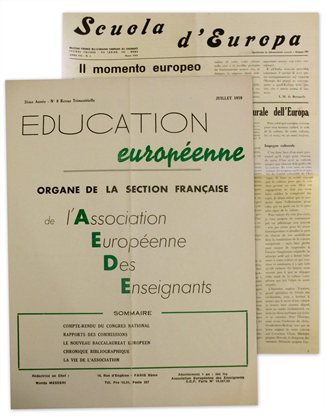Posted on 16 January 2014
Ms Elena Sergi, PhD student at the University of Pavia under the supervision of Prof. Ariane Landuyt, Jean Monnet Professor at the University of Siena, recently conducted a research on the Journals of the European Association of Teachers (AEDE fonds) at the Historical Archives of the European Union (HAEU) in Florence. For her doctoral research Ms Sergi was recently awarded a Sorensen Grant by the President of the European University Institute, Prof. Joseph Weiler which finance a one-month research stay at the HAEU.

In the process of European integration, most movements, political groups and pro-European associations published journals to spread information and to raise awareness of the emerging new political reality of a united Europe. Moreover, these groups used journals to provide a critical, yet biased, interpretation of the process, imbued with the specific values, strategies and objectives of each movement.
Ms Sergi’s research looks at the journals of the European Association of Teachers whose main objective was to create European awareness amongst the teaching force, pupils and students. In particular, the research of Ms Sergi concentrates on the journals of the most active branches, the French with their Education européenne journal and the Italians with the Scuola d’Europa, over a wide period from the foundation of AEDE in 1956 to the early 1970’s. School curricula in those countries made it possible to convey information and to adapt it to the teaching force as well as to young people of all ages. The intention of the journals was also to launch debates amongst readers and interaction by providing publishing space for teachers:
« Une association sans organe d’information est un corps sans âme: l’information est une des tâches les plus importantes. On a dit parfois qu’une bonne partie des enseignants est indifférente (…) aux idées d’intégration européenne. Je ne le pense pas ; encore convient-il de leur donner les informations indispensables, et de leur montrer combien leur coopération est nécessaire pour obtenir une pénétration rapide de ces idées dans les milieux qu’ils peuvent toucher (…) où l’influence de l’instituteur est parfois prépondérante » (André Alers, A nos collègues français, in « Education européenne », n. 1, octobre 1957)
In particular the Italian branch believed that teachers should support the federal European idea as the only possible alternative to the extremism of nationalism. A federal Europe would thus have been supported by the educators in the national education systems. The former issues invited teachers to focus on all disciplines with a common thread of European culture, namely history, geography and literature, but also to promote a new discipline of European civic education in primary and secondary schools and the establishment of a European Community of schools, including universities.
The Journal’s contents shifted substantially between 1968 and 1969 with a significant schism with the past, from the cultural and pedagogic points of view and the institutional perspective. The contestations of 1968 questioned the adequacy of the existing educational models and of the archaic model of democracy. In 1969, Charles De Gaulle left the political stage and the Aja Community Summit re-launched the process of integration along the three lines of completion, strengthening and enlargement of the Community.
The keyword in the bulletins of those years was ‘participation’ and after 1969 the commitment and enthusiasm for the creation of a federal Europe and for a new educational model declined. In both bulletins, the debate shifted from the pedagogical and cultural level to the economic and institutional level with the most frequent subjects now being either of economic nature (the devaluation of the dollar and the global economic crisis) or referring to the enlargement of 1973 (United Kingdom, Ireland and Denmark). The loss of the educational focus created a misbalance between the economic deepening of the Communities and a weakening of the political and cultural integration. Furthermore, the introduction of direct elections to the European Parliament in 1979 was not sufficiently used by the journal editors to promote the formation of a European citizenship through educational means.
The paper of Ms Sergi was presented at the international conference ‘Communicating Europe. Journals and European Integration 1939-1979’ at the University of Perugia-Assisi in May 2013 and has recently been published in the proceedings of the conference.
Consult the AEDE Fonds
Link to the publication
Contact Elena Sergi